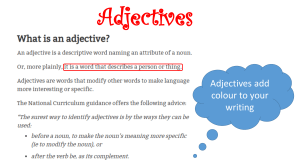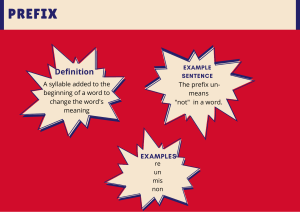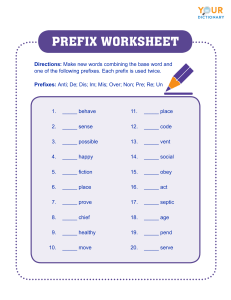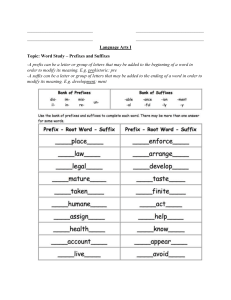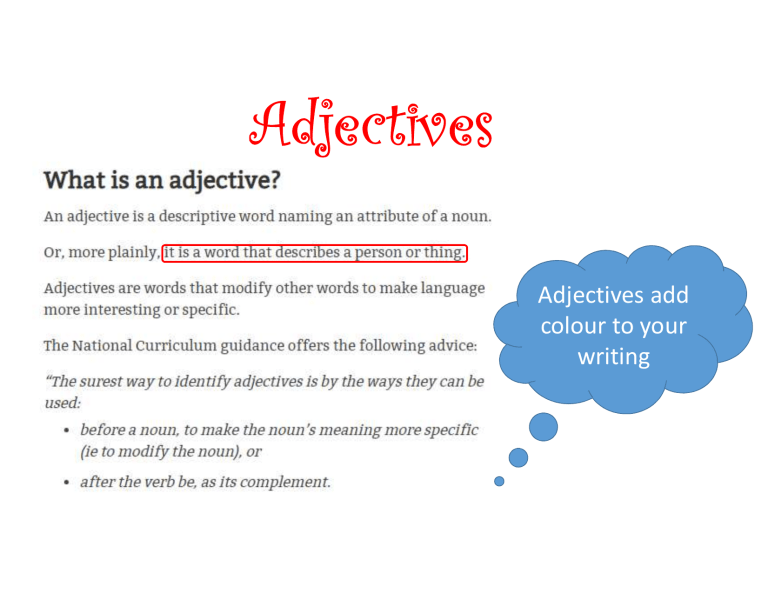
Adjectives Adjectives add colour to your writing Adjective Activity Write down as many adjectives as you can that describes the picture. delicious tasty aromatic expensive colourful sweet famous ancient mysterious huge artistic starry wild fluffy cute ugly speedy tall incredible fake limpid dreamlike peaceful magnificent imaginative silent wild fast stinky stripy regular smelly Adjective Categories Powerful Adjectives SuffixeS You can make some nouns into adjectives or adjectives into nouns by adding suffixes (extra letters at the end of the word). For example, you can make the noun 'noise' into an adjective by taking off the 'e' and adding 'y' to make 'noisy'. Making nouns into adjectives Making adjectives into nouns -able knowledge - knowledgeable fashion - fashionable comfort - comfortable -ce important - importance patient - patience violent - violence -al nature - natural accident - accidental music -musical -ity popular - popularity formal - formality regular - regularity -ous danger - dangerous fame - famous adventure - adventurous -ness happy - happiness lazy - laziness ruthless - ruthlessness -y health - healthy cream - creamy mess - messy -y difficult - difficulty modest - modesty honest - honesty What Is a Prefix? A prefix is a word part that is placed in front of a base word. Common prefixes include pre, bi, and anti. Take a look at the examples below. • A prefix usually changes the meaning of the base word. • Think about the word happy. The prefix un placed in front of the word happy makes a new word with a new meaning: unhappy. The prefix un means not so it changes the meaning of the word happy to not happy. The Two Most Common Prefixes • The most common prefixes are un and re. These two prefixes are the most useful for beginning spellers to learn because they appear frequently and their meanings are easy to understand and remember. Un means not (unhappy = not happy) or the reverse of, or opposite of (as in untie). Re means again (redo = do again) or back (as in repay). There are a lot more prefixes, but let’s just start with a few. Tips for Adding Prefixes • Tip 1: The spelling of the base word never changes. Simply add the prefix to the beginning of the base word, as in the word tricycle. triangle bicycle quadrangle • Tip 2: Be aware that double letters can occur. If you add the prefix un to natural, both the prefix and the base word retain their original spelling. The result is unnatural. • Tip 3: Watch out for prefix look-alikes. Some words contain the same string of letters as a prefix, but upon closer examination you’ll find that they are not prefixes. The re in real is not a prefix. computer Write the right prefix on the lines: dis/unable uncomfortable uncertain insecure uninvited reassure inhabit dis/re/co-connect dis/unlike mistrust return impolite impossible reopen disguise dis/unlike unhappy readjust unknown disability disagree refresh restore informal impatient What is an Do you know any other Affixes? Let’s see if we can identify the prefixes, suffixes and base words below. painless enjoyable decision - decide replacement remove window preview inactivity - active Comparative and Superlative Adjectives Video – Comparative and Superlative Adjectives Rules Hungry Starving Famished Big Intensifiers • Intensifiers are gradable adverbs or adverbial phrases that strengthen the meaning of other expressions and show emphasis. • Intensifiers are generally placed before an adjective to make the adjective stronger. • Example (no intensifier) – The water is cold. • Example (with intensifier) – The water is really cold! The dog barked. noun and verb The dog barked loudly. Noun, verb and adverb – tells you how the verb is done. • More specific time • Whose dog • adjective Later that morning at 10am, Kitty’s naughty dog barked loudly at the grocer’s shop. The grocer shouted. Later that morning, the dog barked loudly. Time link phrase, noun, verb and adverb – TLP tells you when an action happens. Later that morning, the dog barked loudly at the grocer’s shop. Time link phrase, noun, verb, adverb and adverbial phrase – tells you where an action happens. What else could we do to improve this sentence? Connectives At her birthday punctuation she ate a cake the class was boring She ate a cake. Last Saturday, she ate a cake. Last Saturday, she ate a delectable cake. Last Saturday, she ate a delectable cake because it was her birthday. Last Saturday at school, she happily ate a delectable cake because it was her fifteenth birthday. The math class last Saturday was boring because we were exhausted. Last Saturday, we had a difficult math test because I didn’t review. The math class at last Saturday was boring because we are tired. Mary Last Saturday,we had a difficulty math test,because I didn’t review. MichelleCao曹楚琪 The playful class is learning about the most boring part of human hirstory. Alex阿梨克谢 The Math class in Saturday was very boring, because today is a normal weekend! leohuang Last Saturday, the endless class was very boring, because there was a hard mathem atical test. Luna At last Tuesday, we have boring math class because we think it’s difficult. Tedxu The PE class is boring at last Saturday was very boring,because there’s to many wor kout. • Choose a powerful adjective that describes the object. • Use this as a powerful, single word sentence. • Repeat your powerful adjective and add another word (a noun or another adjective) to build a two-word sentence. • Expand fully to create your third sentence. • Can you swap your adjective for a synonym? • For example: • Delectable. • Delectable chocolate. • Delectable chocolate Easter eggs sat in the bowl, waiting for people to buy and consume them. leapy small loud Frog cute green slimy white What is ___________? Underground What is ___________? What is __________________________ (rhymes with Older than human history line above) hard expensive and What is ___________ and __________ ancient ____________? A _________________. What’s brown and sticky? A stick
